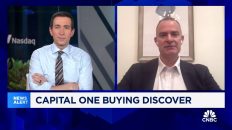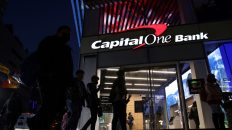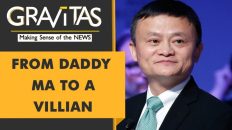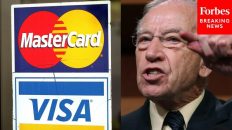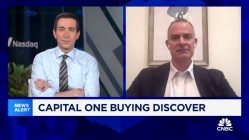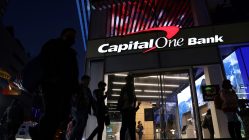I’ve always said there’s a reason we’re born with two ears and one mouth—and it’s because we should be using them proportionately. The best way to truly learn is to listen.
Please also watch in video: Never Stand Still Season 3 | Episode 10 | Salesforce Founder & CEO Marc Benioff
Dan Schulman, President and CEO at PayPal
Linkedin, December 21, 2020
A Year of Listening and Learning on “Never Stand Still”
I’ve always said there’s a reason we’re born with two ears and one mouth—and it’s because we should be using them proportionately. The best way to truly learn is to listen.
Since starting my Never Stand Still conversations over two years ago, I’ve had the opportunity to listen and learn from titans of industry and public figures of all kinds. But this year has been different in so many ways. We’ve faced dual global health and economic crises, a historic reckoning with racial injustice, and a Presidential election in the U.S., all in a short time period. This year in particular, I set out to have Never Stand Still conversations with leaders who could share unique insights into the moment in time we’re in. And while I missed the opportunity to sit down with my guests in person, I had the privilege of hosting virtual conversations with chief executives, athletes, artists, civil rights leaders, and philanthropists around the world that have continued to help me grow as a leader and a global citizen.
Through the ups, downs, twists, and turns of this extraordinary year, here are the learnings from my conversations:
1. Business leaders have stepped up to play an important role during the COVID-19 pandemic—and we must continue.
This year, we’ve watched CEOs make drastic pivots to virtual formats for their entire workforce while maintaining business continuity. They’ve adopted new measures to support employees during this crisis. And so many dedicated company resources to resolve or rebuild from the pandemic. I’ve been inspired by how leaders have taken the pandemic’s challenges in stride. Banco Santander Executive Chair Ana Botín’s described leading a business during 2020 well: “Every day, we have to make difficult decisions that are having an impact on different constituents. It’s impossible…to have a rule book for everything.” This year more than ever, strong leadership required the ability to embrace uncertainty and remain nimble when the playbook was thrown out.
It was encouraging to see so many businesses stay true to their values and continue to support their employees and communities, even as the pandemic forced them to adjust their operations. Nike CEO John Donahoe, who has prioritized the well-being of his workforce by committing to pay continuity for Nike employees, shared how the pandemic has been the ultimate leadership test for him: “Life is hard; leadership is hard…Opening our hearts to the adversity and opening our hearts to challenges and acknowledging that’s part of the process is one of the learnings along the way.” He continued, “When I’m in adversity, I remind myself now is the time where if I show up every day as a whole person that’s open, vulnerable and honest, I’ll look back and be proud.”
At PayPal, like many companies, we first prioritized the health and well-being of our employees, then quickly got to work to secure approval to distribute Paycheck Protection Program (PPP) loans and individual stimulus checks, and bolstered our commitments to small businesses and our local communities. As we continue to weather this storm, all of us will need to continue committing ourselves to doing what’s right for all of our stakeholders and taking all of the challenges thrown at us as learning opportunities.
2. We need to take decisive action to address inequalities.
“Use your power. Companies of all sizes have more power than they realize, especially in our local communities.” I was moved by the truth of these words from my good friend and one of Silicon Valley’s first Black female CEOs, Shellye Archambeau. If the events of this past year have taught us anything, it should be that we need to act on our commitments to drive change. So many organizations have answered this call to arms, but we can still do more.
A few of my guests, including Human Rights Campaign President Alphonso David, explained how critical voting is to helping eradicate injustices. Others, including WNBA player Diana Taurasi and world-renowned cellist Yo-Yo Ma, spoke about the power of our words, as well. And another anecdote that resonated came from award-winning filmmaker Dawn Porter, who released a documentary this year about the life of the late Congressman and civil rights activist John Lewis. She reminded us of Lewis’ decisive strategy and actions over the course of 40 years to achieve long-lasting change. Dawn described that Lewis and other civil rights leaders “studied for six months before they stepped foot onto a bridge or sat at a lunch counter, or boarded a Freedom Rides bus.” They “weren’t looking for an immediate win,” she said. “They were looking for systemic change and they were doing it one step at a time.”
As a CEO, I have a responsibility to take a stand when something is at odds with our corporate values, and to make sure our employees’ voices are heard. This year, in line with PayPal’s values and purpose, we dedicated resources in support of Black and minority communities to set the foundation for continued progress toward social justice. We also worked alongside our co-founders from the Time to Vote initiative to ensure that no employee – from PayPal or elsewhere – had to choose between making their voices heard and earning a paycheck. It’s important that companies like ours continue to use our resources and platforms to make a difference. The need will be just as great in 2021 as it was this year.
3. Economic inclusion will help us advance social justice.
It’s deeply concerning that the racial wealth gap in the U.S. is as wide as it was in 1968. It’s the result of many interlocking and interconnected issues, including limited access to capital and equity financing, employee discrimination, educational disparities—the list goes on. But we have an opportunity to play a meaningful role in addressing the economic underpinnings of the ongoing racial tensions afflicting the U.S. and many countries across the globe.
Many of my Never Stand Still guests are working alongside PayPal to even the playing field within the financial services industry, including MercadoLibre Founder Marcos Galperin, who shared how creating more access to financial tools “helps drive the financial system forward.” Operation HOPE CEO John Hope Bryant similarly emphasized that by bringing more people into the system, empowering them to take control of their finances, and building strong money management skills, “We can get the economic vibration up. You get the access up, you get the opportunity up.”
I also loved another perspective John Hope Bryant shared with me—one of relentless optimism in a year full of instability and uncertainty for our future. “Rainbows only follow storms,” he told me. “No one changes in good times. People only change in bad times…and I think [this moment we’re in is] a chance for us to get everything right.”
4. We are responsible for creating the world we want to live in.
I’ve long said that profit and purpose aren’t mutually exclusive; they work hand in hand. Companies have so much power to make change, and it’s encouraging to see so many taking action now. A lot has been discussed this year about returning to a “new normal,” but I’d offer an additional revision: We need to emerge from this year working toward a “better normal.”
Compelling corporate citizenship will play a role in how we rebuild. Something shared by Salesforce CEO Marc Benioff, a long-time trailblazer in “compassionate capitalism,” rings true here. Marc explained the importance of knowing your values and emphasized that purpose-driven brands are poised to make the most impact. It’s certainly worked for Salesforce: “While other companies…have run out of gas in the very markets that we’re in, we continue to go fueled by the good karma that has been created by [our] actions,” Marc said. John Donahoe acknowledged that, “We have a lot of rebuilding to do as an economy and as a society,” but that taking actions to do better have placed us on the right path to recovery.
The goodwill that we’ve built during this crisis will help us right the ship, so long as we keep our momentum. As we begin to rebuild, we must take all necessary steps to ensure that our post-pandemic society is stronger than it was pre-pandemic and, to use Marc’s words, that means we can’t “run out of gas” now.
The people I spoke with on Never Stand Still are all incredible leaders in their fields and are advocating for many of the things we’re working to accomplish at PayPal, from empowering the members of our community to reach new heights, to fighting economic inequality. I’m grateful to my guests—John Hope Bryant, Diana Taurasi, Dawn Porter, Alphonso David, Yo-Yo Ma, Ana Botín, Marcos Galperin, Shellye Archambeau, and Marc Benioff—for giving all of us the opportunity to listen and learn from them. I hope they learned some new things from our conversations as well.
I appreciate each of you for joining me along the way. Leave me a comment to let me know your favorite lesson from Never Stand Still this year and what you want to learn more about next season. If you missed any episodes and want to catch up, you can find them on YouTube, Apple Podcasts, and Spotify.



